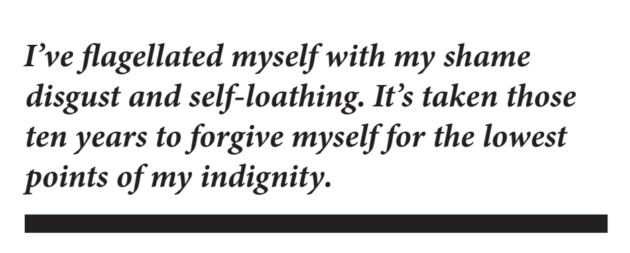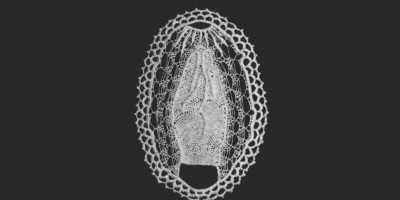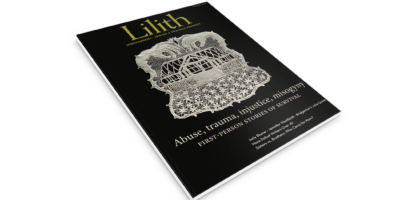
Art: Layla Klinger, “Krysia (Hands 283+284)”
Her Husband’s Abuse, Her Strength of Mind
Months into my marriage to a stranger at age nineteen, I finally turn my back on him—literally. Such a simple action feels completely fraught in a setting like this: I am an animal, alone in a clearing, turning my back to an advancing dog that is frothing at the mouth, hatred gleaming in its eyes, in an attempt to prove that I am the bigger animal. It’s this primal feeling that stems from back when we were hunter-gatherers, facing down ferocious predators for our own survival.
The first step of breaking free from the will of another is establishing a fragment of power again, of free will. At that point, I am completely beyond dignity—this is a bid for my life.
“You have no power over me,” I say simply as I turn my back on him.
From our youth, we learn skills, such as how to cook our grandmothers’ recipes or how to wear make-up without looking like we are wearing make-up. “But we are never taught how to face down a 6’2″, 250 lb man alone in our own living rooms at night.
Turn away unwavering. Force yourself to be still and seem relaxed, when every muscle and fiber of your being are tensed, waiting in trepidation. Keep your earbuds in and pretend to listen to music defiantly, while nothing plays and you listen intently to the blood angrily pumping through his veins. Sit in sudden blindness to your enemy—a terrifying but necessary vulnerability, because for this to work, it has to be all or nothing.

The line I’d spoken calmly and firmly as I turned away—“You have no power over me”—was a reference to the movie I’d watched religiously since I was eight, Jim Henson’s The Labyrinth from 1986—one that even now still feels like an unfiltered piece of my soul captured on film. In The Labyrinth, the young protagonist Sarah (played by ethereal teenage Jennifer Connelly) must fight her way to the center of the Goblin King’s labyrinth, in order to save her kidnapped infant brother from Jareth, the Goblin King (iconically portrayed by legend David Bowie). Her journey is reflected in the words the movie opens on her reciting from her titular favorite book: “Through dangers untold and hardships unnumbered, I have fought my way here to the castle, beyond the Goblin City, to take back the child you have stolen. For my will is as strong as yours, and my kingdom is as great.” Then after a few moments trying to remember the final line, she gives up and reads it aloud from the book: “’You have no power over me.’ Damn, I always forget that part.”
I, too, forget that moment of power sometimes. In the decade since my marriage ended, I’ve flagellated myself with my shame, disgust, and self-loathing. It’s taken the most part of those ten years to forgive myself for the lowest points of my indignity (as if I alone subjected them upon myself). Even still now, bile rises from the pit of my stomach and my face burns with fury when I periodically flash back to that time.
The flashbacks begin like this. My parents assure me it’s all fine and that I should get married; I am frightened and don’t want to go through with it. I have met him in person once. “I hadn’t even wanted to keep talking to him on the Jewish dating site where we met, initially writing him off as one of those “crazies” you meet online. But my mother had been insistent. Neither of my parents come from an Orthodox background, and their warped version of Orthodox matchmaking isn’t something personally meaningful to them—it’s just a convenient, face-saving means to an end (they have wanted me out of the house since I was a preteen).
I am sitting with him in a dingy, dimly lit courthouse office, clipboard across my lap and scarf over my hair.
“Have you ever been married before?” I read, as I go through all the questions on the marriage license form.
“What? Why would you ask me that?” He asked, annoyed.
“It asks on the form,” I say.
“No, of course not. Just you,” he responds, hurriedly brushing off the question.
I check the box for “no.” I find out later that this is a lie.
The first rape blends into the twentieth. He bites my face and tries to drag me by my hair to the bedroom from the living room in our shitty apartment. I keep telling my parents what’s happening over the phone, and they tell me to stop calling them. I heat up water on the stove so I can fill the tub just enough to splash water up at my pregnant belly to clean myself, because he has full control of the finances—he won’t pay the gas bill, since he bathes every day at the mikvah and doesn’t need hot water at home.
I do not have access to a car, money for a laundromat, or a washing machine at home. I am still expected to do all the housework, however. So the musty smell of nicotine that’s permanently woven into the cheap beige carpet of our apartment is temporarily masked by the smell of the bleach I pour into the tub. I add in a couple pots of hot water mixed with the cold from the tap. I scrub his sweaty socks by hand.
When I come home from the gynecologist appointment in which I am told that there is no longer a heartbeat, he is sitting on the couch, on the phone with his bank. I feebly break the news to him.
“I don’t have time for this,” he says, cold and impatient.
He adds that it wouldn’t have happened if I had listened to him, insinuating that I am not an obedient enough wife. It’s too much, even for me at that point, so I storm out. My mother drives to find me and brings me back to him. I get pregnant again immediately, despite my doctor’s warning not to have sex for at least 3 months after I have the dead fetal tissue removed.
My sister-in-law sits in my parents’ living room in an Ikea chair with the rest of us, scrolling through her phone.
“How much do you want to bet he’s already on other dating sites, luring in his next victims?”
It turns out that she’s right. The third-party rabbis who’ve involved themselves in my situation do some prodding around from their end and get back word through my mother: Not only has he been married and has abused a wife before, but he is actively trying to have multiple wives in different states and children by them each. (It seems far too colorful to be true, and yet my mind flashes back to a teasing newlywed conversation:
“You’re not going off to visit your other wife are you?” I’d teased innocently. “Some people are into that kind of thing, you know,” my ex had said, suddenly too interested. “There are some Sephardic* communities where they do that. It’s not against halacha.” [*I do not know that this is an accurate claim.] Back then, I’d been annoyed with the strange place he’d taken the flirty joke. Afterwards, it made so much sense that I wanted to curl up in a hole somewhere far away.)
He makes a business of holding his wives’ religious divorces ransom in exchange for payouts. I do not want to submit to his insanity, so I declare: he will not make a cent off of what he has done to me and other women, religious divorce be damned. (In halacha, a wife must be granted a divorce by a husband, and has little power if he refuses to do so.) Regardless, the male rabbis involved go behind my back and pay him a few thousand dollars, plus the return of the ring, in exchange for a get—because they figure I am too young, emotional, and female to know what I really want.
“She thinks you’re not very smart,” a later boyfriend later tells me of a mother from my now-former Orthodox community as we sit in a coffee shop. My brothers and I have been friends of her children for years. “Because you married that guy and fell for that whole con.”
“Life seems so much harder for you. I just don’t understand why you wouldn’t have just gotten an abortion,” the same boyfriend says, climbing into bed one night, echoing what his mother has just been drilling him about in the other room, while we visit them in Massachusetts. She thinks I am dating him for his money (they are apparently wealthy). My child is about 5 at this point. I’m caught too off-guard to react appropriately.
“I mean, I was still married,” I finally manage. “People don’t usually get abortions when they are married.”
In the years since, I remember those things and live under the shadow of victimhood—as if I’ve never had any strength of my own to do anything but be swept along in the current of others. I’ve believed in that for so long that I’ve allowed it to flavor how I show up in my own life.
Because I forgot the rest of that moment: how I turned my back and refused to give up my power. He screamed more. Still, I kept my back resolutely turned, ignoring him, refusing to succumb to his tactics of control.
Like the girl in my favorite film, I frequently forget that the final line to regain your own power is “You have no power over me.”
I wish I’d remembered sooner—because he backed down. He retreated and went to do something else. I won a standoff that was just a battle and hardly a glimpse of the coming war—but it was the beginning. It was a flexing of my muscles, testing my strength as I first found my footing back toward being an individual with free will. It was such a small moment that it’s easy to forget; however, it generated the power to change my entire narrative. That moment changed the trajectory of my life. Despite my smallness back then, I still carried the immense potential for transformation just in my own stillness.
I turned away to reclaim my power. I’ve never turned back.
*Pseudonym



